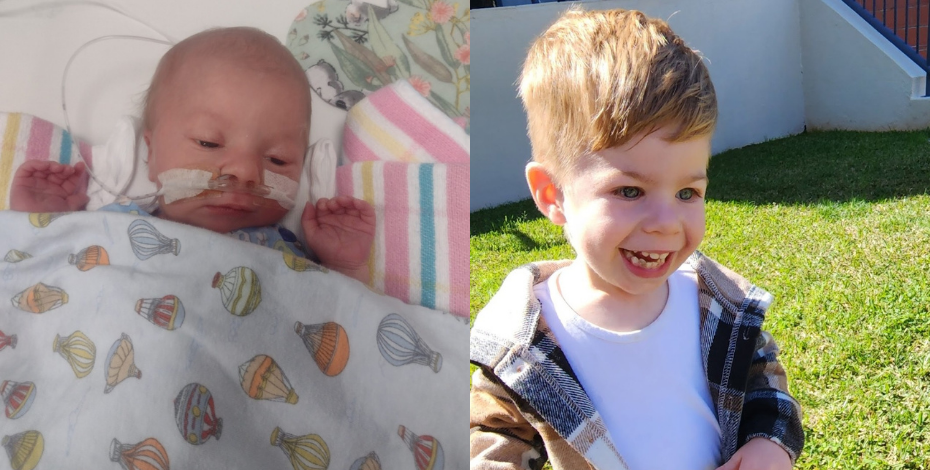
Joseph is a two and a half year old who was diagnosed with Prader-Willi syndrome (PWS) at birth, a rare and complex genetic disorder. He is now thriving with the support of his physiotherapist and therapy team, and has attained the majority of age-appropriate skills just-in-time to start pre-school this year.
PWS affects 1 in 17,000 children in Australia and impacts all aspects of Joseph’s life. His poor muscle tone has caused delays in his motor skills, his oral and speech development, and his functional independence in the community. Joseph has learnt many new skills to support his participation, and is working on gestures, words and signs to communicate with those around him.
The two-and-a-half-year-old was diagnosed with the condition shortly after birth, after having excessive sleepiness, weak cries, poor sucking reflexes and severe hypotonia, all of which are typical symptoms in babies with the condition.
Although Joseph continues to experience delays in his gross and fine motor skills, many of these skills are now at an age-appropriate level which is a testament to the high level of consistent and goal-oriented early intervention therapy supports he has received since accessing National Disability Insurance Scheme (NDIS) funding. Joseph learned to walk before he turned two years old, which is earlier than the typical age for children with PWS (24-27 months). He is now learning new play skills such as jumping and running.
Joseph and his parents began working with APA Research Physiotherapist Cara van Wyk, who is the director of NeuroCentric, a paediatric, developmental and neurological physiotherapy practice based in NSW. For a genetic condition like PWS, and for neurological conditions and development delays, Cara’s focus has been on skill development and impairment management.
Cara first saw Joseph when he was three months old, a relationship that his mum, Rita, describes as “life-changing”. When Cara first treated Joseph, he was super ‘floppy’ and unable to lift his head. Now, he is walking, climbing and beginning to jump.
“I think it is critical for people to understand the value of early intervention, specifically physiotherapy treatment. The knowledge and care Cara has dedicated towards our son has made a significant difference to Joseph’s life,” said Rita.
Early intervention is centred on the concept of neuroplasticity, where the brain is able to remodel to accommodate and compensate in order to learn new skills.
“For this to occur, high repetition of skills and activities is required to form new neurological pathways, meaning that regular physiotherapy intervention combined with home exercise programs (overseen by a physiotherapist), are often the catalyst for skill development,” said Cara.
“He is the happiest little boy who loves to engage in play with other children and loves playing at the park. We recently enrolled him in swimming lessons and soccer, to consolidate the work we are doing with Cara to help with his strength and the goals we have set in place,” Rita said.
Joseph has been an NDIS participant for two years, and his progress as a result of starting therapy early is very significant, not only because of the profound improvements in his health and wellbeing, but because early intervention has meant that he has significantly lower long term care needs (and therefore a lower funding requirement).
“Supporting children, adolescents and young adults to build the skills they need for daily living and participation with others, promotes independence and thereby reduces the physical support they need. This means that children can do more by themselves, and engage better with their peers and explore the world around them. For many families, this also means reduced support worker and equipment costs,” Cara explained.
Joseph’s parents are very grateful to have the support of the NDIS to ensure their son can attend regular therapy and continue to be empowered to live a happy and healthy life. The profound improvements Joseph has made speak to why the APA has been long advocating to ensure people with disability have access to quality physiotherapy and the supports they need.
“If it wasn’t for the help of the NDIS, we wouldn’t have been able to provide Joseph with the early intervention he required. NDIS has meant that we are able to maintain regular therapy sessions that have helped Joseph achieve his goals and meet milestones,” said Rita.
Joseph and his family are working with Cara to continue building his strength, endurance, coordination and have their sights set on him running, jumping, kicking a ball and riding a bicycle. His parents are hopeful in the future he won’t require as much therapy and will be able to participate in the community like everyone else, living an independent and fulfilling life.
For further information, please contact:
Manager, Media and PR
Tel: 03 9092 0838
Email: media@australian.physio
Related tags
